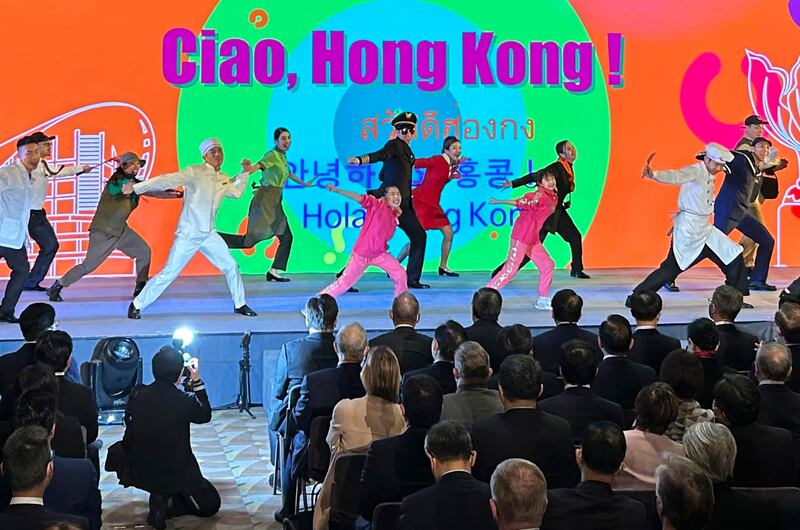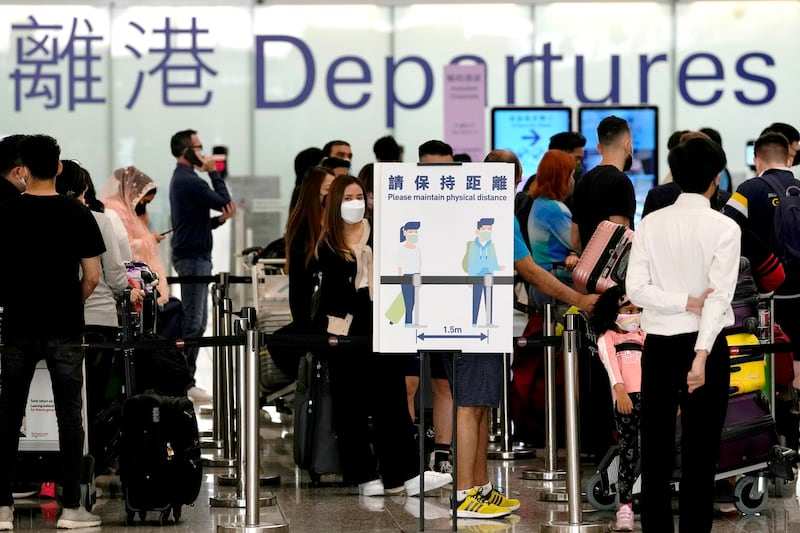Hong Kong's population has shown a sudden uptick following years of mass emigration, suggesting more people are being allowed to settle there from elsewhere to replace those who left due to an ongoing crackdown on dissent, analysts said.
The city's population rose by 2.1% to 7,498,100 in the 12 months ending June 30, according to provisional government figures released on Tuesday.
Officials said the rise was due to the resumption of normal travel in and out of Hong Kong following the relaxation of COVID-19 measures in late 2022, as well as a number of schemes seeking to attract talent to the city.
"Many Hong Kong residents who had stayed abroad during the epidemic have returned to Hong Kong, while some mainland and overseas persons have also been admitted to Hong Kong through various schemes," it said in a statement announcing the figures.
The government expects its talent and labor schemes to continue to fuel population growth over the next two decades, citing overall population aging and falling fertility rates as future challenges.

By 2046, 50 years after the 1997 handover to Chinese rule, it wants to attract a net inflow of permanent residents of just under 900,000, with just over half a million non-permanent residents, the statement said.
The figures come as the Hong Kong authorities try to woo fresh talent to come to the city amid an ongoing exodus of highly qualified people, handing out free plane tickets to visitors and offering work visas to attract professionals to replace those who have left, many of them from mainland China.
Demographic shift
Net departures of permanent residents from Hong Kong totaled 113,000 for the whole of 2022, prompting calls from media backed by the Communist Party for the government to act to stem the brain drain.
The number of high net worth individuals in Hong Kong fell by nearly 30% between 2012 and 2023, while the city's ranking as a destination for the wealthy has fallen several places.
Middle-class families have also been selling off property and voting with their feet, citing the curbs on freedom of speech and growing political interference in schools as driving factors in their decision to leave.
Sociologist Chung Kim-wah said relatively few of those who left for political reasons are coming back to the city, and that the rise in population is likely driven by government incentives drawing people from elsewhere, including those who emigrated to Australia and Canada in the 1980s or 1990s.
"After three years of closed borders due to the pandemic, it's natural that a lot of people in mainland China are looking to live overseas," Chung said. "They apply to emigrate to Hong Kong or Macau, or they use Hong Kong as a stepping stone and then go elsewhere."
"The government has launched [various] talent-grabbing schemes, with 47,000 such visas approved during the first half of this year," he said.
‘Population cleansing’
Current affairs commentator Sang Pu said the government may also have found other ways to move large numbers of people to Hong Kong from elsewhere in China.
"The Chinese Communist Party is using methods like population cleansing, deliberately moving some people to Hong Kong, not for economic reasons, but governance ... and population exchange," he said.

"[They want to] cleanse the city of anti-communists and anti-communism, and turn it into somewhere that is totally submissive like Xinjiang or Tibet, so Hong Kong will never go back to the way it was before," Sang said. "That's the Chinese Communist Party's goal."
Veteran journalist Poon Siu-to said in a recent commentary for RFA Cantonese that the crackdown on dissent under the national security law looks likely to expand to cover much milder forms of opposition to the government.
"Certain establishment figures on the margins of Hong Kong's political elite have recently expressed concern publicly ... that political purges will continue to spread under the national security law, expanding from 'hard confrontation' to 'soft confrontation,' which is seemingly ubiquitous," Poon wrote. "Their critiques hit the mark."
"National security law enforcement actions are frequent and high profile, and now they are looking at expanding their scope to deal with undefinable 'soft confrontation'," he said. "This means that the political curse [on Hong Kong] will be never-ending."
He said the crackdown will likely continue to push people into emigrating.
"Hong Kong people who are vacillating between going and staying will have yet one more reason to leave, foreign capital won't want to come back, making yet another stumbling block to economic development," Poon warned.
Translated by Luisetta Mudie. Edited by Malcolm Foster.
